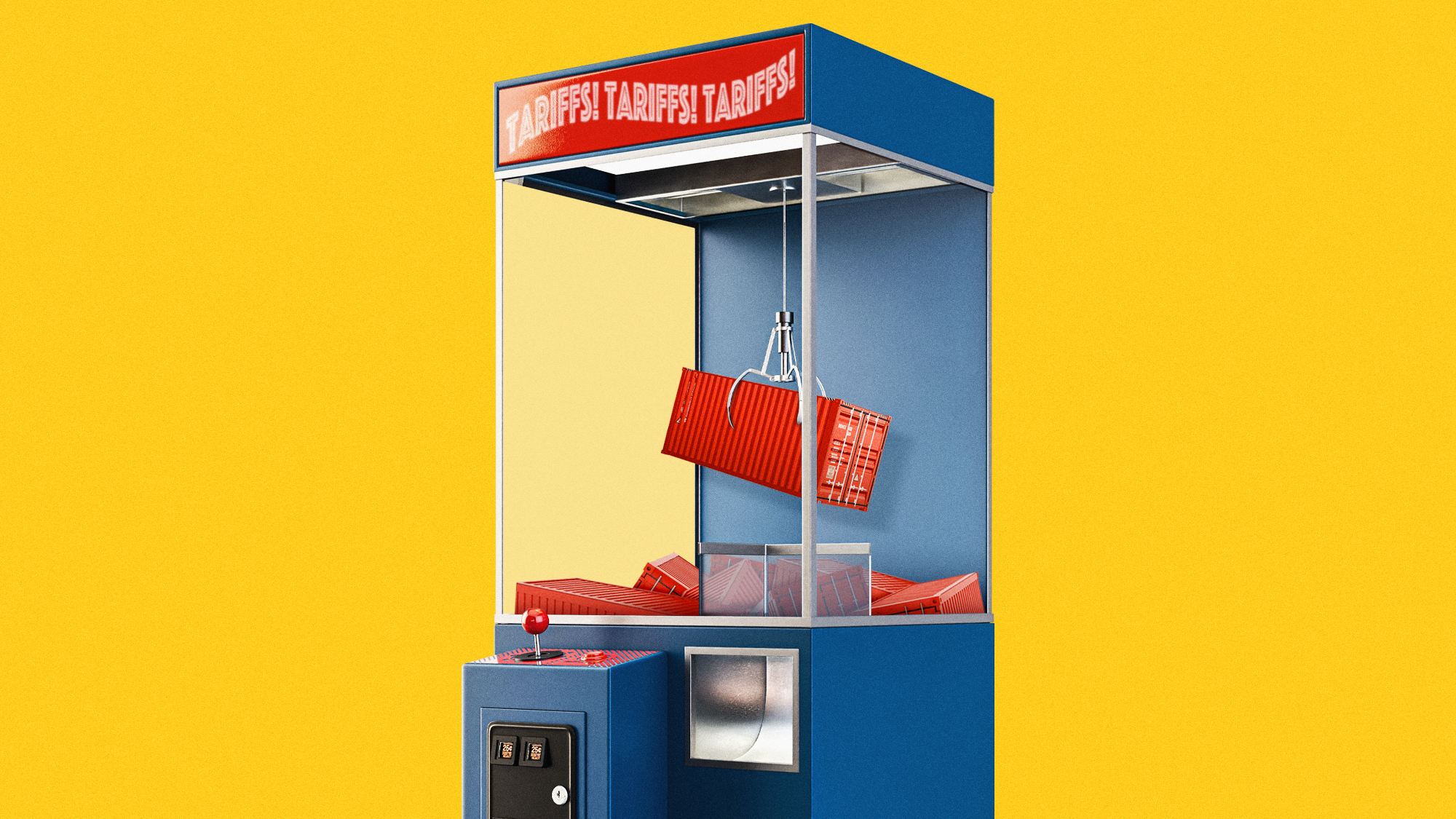Trump tariffs: five scenarios for the world's economy
A US recession? A trade war with China? How 'Liberation Day' could realign the globe

A free daily email with the biggest news stories of the day – and the best features from TheWeek.com
You are now subscribed
Your newsletter sign-up was successful
Last night, Donald Trump fired the first big shots in a global trade war, announcing sweeping tariffs on friend and foe alike.
The US president ordered a 10% "baseline tariff" on all imports to America, and higher "reciprocal tariffs" on goods from about 60 countries or trading blocs that have a high trade deficit with the US. Dubbing yesterday "Liberation Day", he said it was "our declaration of economic independence".
But, echoing many other world leaders, European Commission chief Ursula von der Leyen described Trump's moves as a "major blow to the world economy". There will be "dire" consequences for "millions of people around the globe", she said in a statement today. Here are some of those potential consequences.
The Week
Escape your echo chamber. Get the facts behind the news, plus analysis from multiple perspectives.

Sign up for The Week's Free Newsletters
From our morning news briefing to a weekly Good News Newsletter, get the best of The Week delivered directly to your inbox.
From our morning news briefing to a weekly Good News Newsletter, get the best of The Week delivered directly to your inbox.
1. The US falls into recession
"Trump inherited an expanding economy, with Wall Street buoyed by speculation that his deregulation and tax-cutting agenda would stoke GDP growth," said the Financial Times. But the tariffs present a "severe risk" to a US economy that is "already rapidly losing momentum". This week, Goldman Sachs raised the probability of a US recession in the next 12 months to 35%, up from 20%. After last night, that probability is "materially higher", said Simon French, chief economist at Panmure Liberum.
US stocks "plummeted" in after-hours trading, said CNN. "We would characterise this slate of tariffs as 'worse than the worst-case scenario'," said Dan Ives, an analyst at Wedbush Securities. Democrats accused Trump of crashing the economy. "This is not Liberation Day; it's Recession Day," said House Minority Leader Hakeem Jeffries.
2. The US starts a trade war with China
China is "perhaps the biggest loser" in America's new trading regime, said The Telegraph. Trump imposed 34% reciprocal tariffs on all Chinese goods – and analysts believe that's in addition to the two rounds of 10% tariffs Trump has already imposed, meaning a combined tariff of 54%.
China is also the only country that has had "no carve-outs" and "no delays", said Helen-Ann Smith, Asia correspondent at Sky News.
A free daily email with the biggest news stories of the day – and the best features from TheWeek.com
Although China's economy is the world's second largest, it is already "struggling" and growth has "slowed dramatically". A "huge" 20% of its GDP comes from exports, so a "trade shock will have a major impact".
But this is "still a system that fears instability above all else, and can't be seen to lose face". China's leaders are "unlikely to take things lying down". Beijing has already called for Washington to "immediately cancel" the tariffs, promising countermeasures. "There is no winner in a trade war, and there is no way out for protectionism," the commerce ministry said.
3. India could benefit
Trump has repeatedly labelled India a "tariff king" and a "big abuser", pointing at the US trade deficit of $45 billion (£34 million). India reacted "phlegmatically" to Trump's 27% tariff, disappointed that weeks of negotiation and Trump's "good personal rapport" with Prime Minister Narendra Modi "failed to result in a lower rate", said Amrit Dhillon in The Times.
But disruption "often creates opportunity", said the BBC's India correspondent, Soutik Biswas. Trump imposed even higher tariffs on China, Vietnam (46%), Bangladesh (37%) and Thailand (36%), and this might "open space" for India's textiles and electronics industries to expand in the US market. In the machinery and automobile sectors, India could also "capitalise" on "tariff-driven relocation" from China and Thailand, by "attracting investment" and "scaling production".
Overall, the tariffs could "act as a catalyst for India to gain from global supply-chain realignments", Ajay Srivastava, of Delhi-based thinktank Global Trade Research Initiative, told the broadcaster.
4. The US has a trade war with the EU
The 27-nation EU was hammered with 20% tariffs: an economic "declaration of war" that would cause tens of billions of euros' worth of damage, said Bernd Lange, the German Social Democratic MEP who leads the European Parliament's international trade committee.
The EU retaliated immediately to America's 25% levy on steel and aluminium last month. "And we're now preparing for further countermeasures to protect our interests and our businesses if negotiations fail," said von der Leyen in her statement today.
5. The UK might have to pick a side
Britain got away with the baseline tariff of 10%. It was given a "special rate", said Sebastian Gorka, a White House adviser. "After Brexit, you've reaffirmed your independence," he told BBC's Newsnight.
Whitehall officials believe "things could have been much, much worse", said Andrew McDonald at Politico. But 10% is still "a very significant blow to the UK economy", especially on top of the recent 25% tariff on steel and aluminium. Plus, other countries, including Afghanistan, also "escaped relatively lightly" with 10%, despite having higher deficits with the US than the UK. "Even the Taliban got a better deal than Starmer," said an SNP official.
Business Secretary Jonathan Reynolds said "nothing was off the table" in terms of potential retaliatory action, but maintained that the UK was trying to work towards a trade deal that would eliminate the tariffs.
"Politically and economically, Starmer now faces a moment of significant peril," said The Times. In "stark contrast" to the EU, Starmer has "made making friends with Donald Trump a central plank of his foreign policy". But there was "no sign" yet that his "courting of the president" has had any impact. If Starmer fails to sign a trade deal, it will "only increase pressure" for a "tougher approach".
Harriet Marsden is a senior staff writer and podcast panellist for The Week, covering world news and writing the weekly Global Digest newsletter. Before joining the site in 2023, she was a freelance journalist for seven years, working for The Guardian, The Times and The Independent among others, and regularly appearing on radio shows. In 2021, she was awarded the “journalist-at-large” fellowship by the Local Trust charity, and spent a year travelling independently to some of England’s most deprived areas to write about community activism. She has a master’s in international journalism from City University, and has also worked in Bolivia, Colombia and Spain.
-
 Trump’s EPA kills legal basis for federal climate policy
Trump’s EPA kills legal basis for federal climate policySpeed Read The government’s authority to regulate several planet-warming pollutants has been repealed
-
 Political cartoons for February 13
Political cartoons for February 13Cartoons Friday's political cartoons include rank hypocrisy, name-dropping Trump, and EPA repeals
-
 Palantir's growing influence in the British state
Palantir's growing influence in the British stateThe Explainer Despite winning a £240m MoD contract, the tech company’s links to Peter Mandelson and the UK’s over-reliance on US tech have caused widespread concern
-
 Currencies: Why Trump wants a weak dollar
Currencies: Why Trump wants a weak dollarFeature The dollar has fallen 12% since Trump took office
-
 Is the US in a hiring recession?
Is the US in a hiring recession?Today's Big Question The economy is growing. Job openings are not.
-
 TikTok: New owners, same risks
TikTok: New owners, same risksFeature What are Larry Ellison’s plans for TikTok US?
-
 Trump wants a weaker dollar, but economists aren’t so sure
Trump wants a weaker dollar, but economists aren’t so sureTalking Points A weaker dollar can make imports more expensive but also boost gold
-
 Why quitting your job is so difficult in Japan
Why quitting your job is so difficult in JapanUnder the Radar Reluctance to change job and rise of ‘proxy quitters’ is a reaction to Japan’s ‘rigid’ labour market – but there are signs of change
-
 Leadership: A conspicuous silence from CEOs
Leadership: A conspicuous silence from CEOsFeature CEOs were more vocal during Trump’s first term
-
 The end for central bank independence?
The end for central bank independence?The Explainer Trump’s war on the US Federal Reserve comes at a moment of global weakening in central bank authority
-
 Will Trump’s 10% credit card rate limit actually help consumers?
Will Trump’s 10% credit card rate limit actually help consumers?Today's Big Question Banks say they would pull back on credit